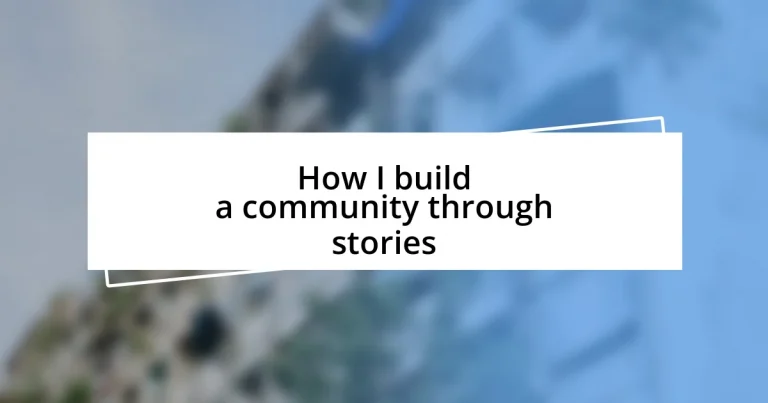Key takeaways:
- Storytelling fosters a sense of connection, empathy, and belonging, encouraging individuals to share their own experiences.
- Identifying audience interests and creating relatable narratives strengthens community engagement and participation.
- Sharing success stories and personal struggles builds trust and long-term relationships, motivating others and creating a supportive environment.
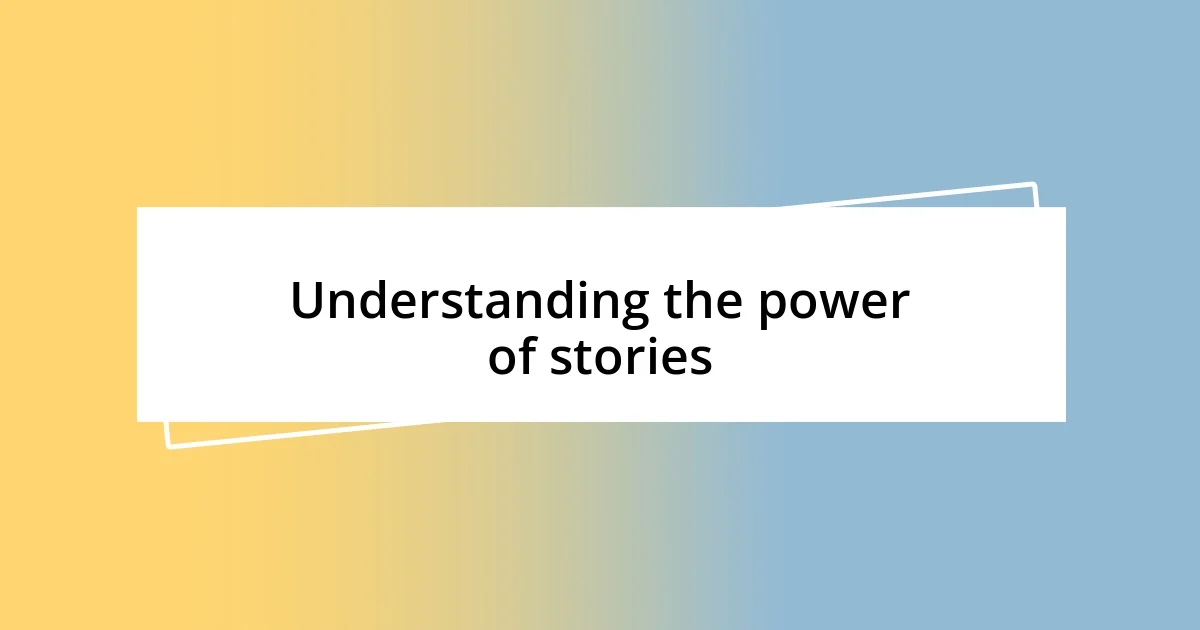
Understanding the power of stories
Stories have an incredible ability to connect people on a deeper level. I still remember the first time I shared a personal struggle during a community gathering; the room fell silent, and suddenly, everyone felt that shared experience. Isn’t it fascinating how a simple story can elicit empathy, create bonds, and foster a sense of belonging among diverse individuals?
When I think about the power of storytelling, I often reflect on the way my grandmother used to weave tales of her childhood. Her stories brought history to life in my mind, making me feel as though I were there with her. Have you ever noticed how a well-told story can transport you to another time and place, igniting emotions that resonate with your own experiences?
The vulnerability involved in sharing our stories can be intimidating, yet it’s precisely that vulnerability that often resonates most with others. I’ve found that when I open up about my own challenges—whether it’s fear of failure or moments of triumph—it allows others to do the same. Don’t you think that by embracing our stories, we not only lift ourselves but also empower others to share their journeys?

Identifying your audience’s interests
Identifying your audience’s interests is crucial for building a vibrant community. When I first started sharing my stories, I immersed myself in the topics that resonated most with my audience, tweaking my approach based on their reactions. This process transformed from mere observation to a kind of alchemy; understanding their passions helped me craft narratives that felt relevant and engaging.
To pinpoint those interests, consider these strategies:
- Engage with your audience: Simply ask them what matters most to them in conversations or polls.
- Observe their reactions: Pay close attention to which stories or topics spark enthusiasm, laughter, or even tears.
- Analyze feedback: Use surveys or comments to gain insights into what resonates and why.
- Be present: Attend community events or online spaces where they gather, soaking in their discussions and likes.
- Follow trends: Keep an eye on broader social or cultural movements that excite your audience.
By anchoring your storytelling to their interests, you create a sense of home—sparking connection and encouraging dialogue.
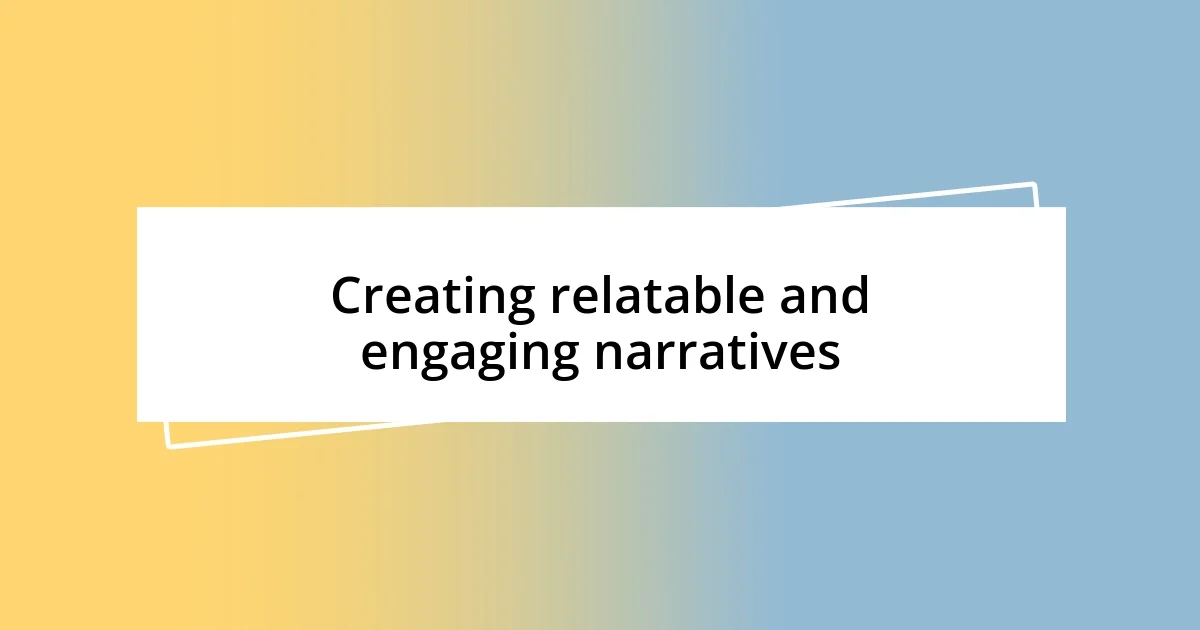
Creating relatable and engaging narratives
Creating relatable and engaging narratives is all about unlocking shared experiences. I’ve discovered that when I weave in everyday moments from my life, they often resonate deeply with others. For instance, there was a time I forgot a crucial deadline at work, and my embarrassment quickly transformed into a humorous story that cracked up my friends. Have you ever had one of those moments where you realize your blunders hit home? It’s moments like these that help shape a community that can laugh together.
I believe that including universal themes can elevate a story, making it relatable across diverse backgrounds. I often reflect on my personal struggles with anxiety and how detailing that journey prompted others to share their experiences too. It’s remarkable how vulnerability invites connection. Have you ever shared something personal that seems to open floodgates of trust? In sharing my truths, I’ve noticed my community mirror that openness, forging stronger ties because we realize we’re not alone in our feelings.
Using vivid imagery and emotional language can help create a lasting impact. I remember telling a story about my first camping trip, where a sudden downpour turned our tents into small swimming pools. The laughter and chaos in that moment painted a picture that others could easily relate to; it brought back their own outdoor adventures gone awry. How often do you find yourself transported back to a memory through storytelling? That transport isn’t just about the tale itself but the emotion it evokes, allowing all of us to engage on a deeper level.
| Aspect | Example |
|---|---|
| Everyday Moments | Forgotten deadline turned into a humorous story |
| Universal Themes | Journey through anxiety invites shared experiences |
| Vivid Imagery | Camping trip chaos evokes relatable memories |
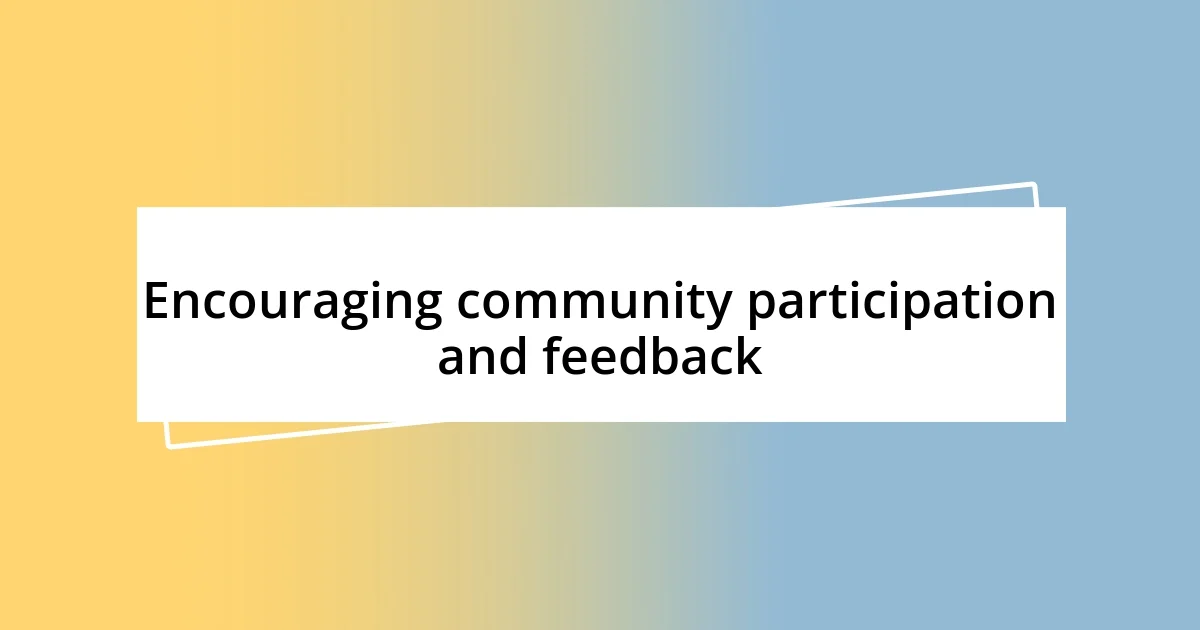
Encouraging community participation and feedback
I’ve learned that actively encouraging community participation often hinges on creating an inviting space for conversation. For example, after sharing a story about navigating change in my career, I invited my readers to share their own experiences. The response surprised me! People opened up about their journeys, revealing how change impacted their lives. It became clear that when I extend that personal invitation for dialogue, I’m not just sharing; I’m fostering a rich tapestry of shared stories.
Feedback is a treasure trove of insight, and I’ve found that asking for it doesn’t have to be intimidating. I once launched a simple “What’s your story?” prompt on social media, and the flood of responses taught me so much. Did you know that sometimes just the act of asking for feedback can create a deeper bond? It shows that every voice matters, empowering individuals to contribute their thoughts and feelings, which in turn fuels the community’s growth.
Celebrating contributions can amplify participation levels significantly. When someone shared a heartfelt story about a family tradition, I made sure to highlight it in my next post. I remember how it felt to receive a warm shout-out for my own contributions in a similar context; it made me feel seen and valued. Have you ever felt that rush of excitement when your voice is acknowledged? This positive reinforcement not only keeps the dialogue flowing but also encourages others to join in, knowing their stories are worth sharing.
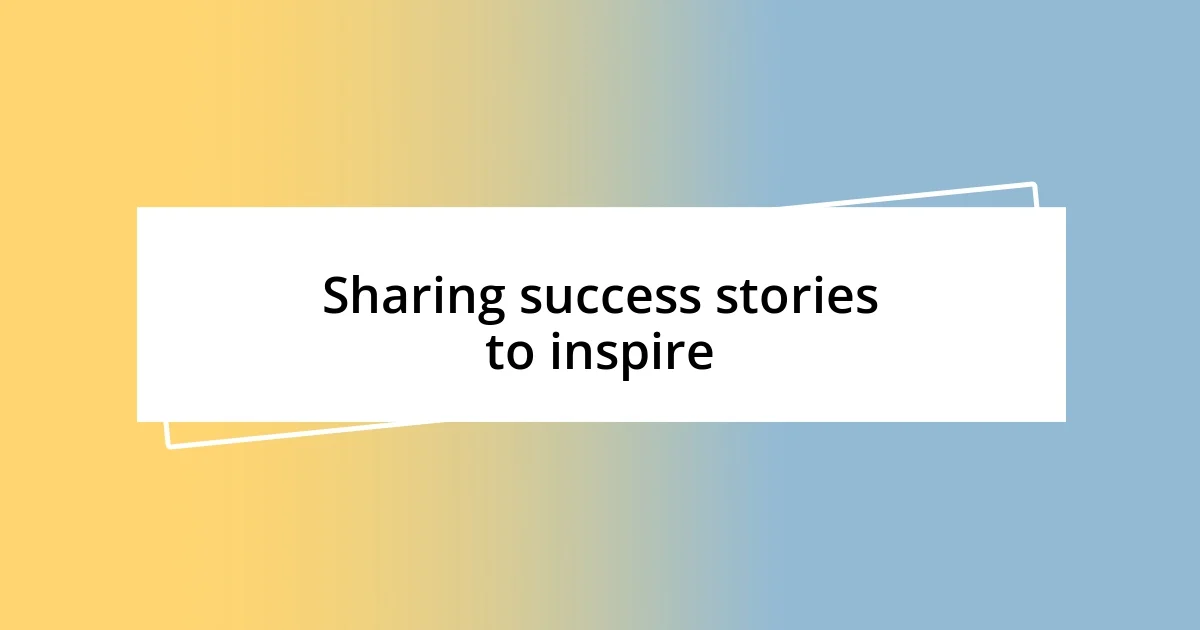
Sharing success stories to inspire
Sharing success stories can be a transformative way to inspire community members, and I vividly recall a time when I shared a turning point in my life. After landing a job that felt out of my reach, I opened up about the numerous rejections I faced prior to that moment. It was as if a light flickered in the eyes of my peers when they realized that obstacles could lead to breakthroughs. Have you ever felt that surge of encouragement from a story that mirrored your own journey?
I’ve also witnessed firsthand how success stories can spark hope during challenging times. In a recent gathering, a friend boldly shared how she overcame her struggles with self-doubt to pursue her passion for art. The room buzzed with energy as others began to share their aspirations too, creating a ripple effect of motivation. Isn’t it amazing how one person’s triumph can light a pathway for others to follow?
Moreover, I’ve noticed that the inclusion of tangible outcomes in success stories can cement their inspirational value. For instance, when I discussed my journey of building a small business and the milestones I reached—like my first sale—it resonated with aspiring entrepreneurs in our group. They could visualize their own paths through the details I provided. Have you ever been inspired to take a leap after hearing how someone else made it happen? It’s those relatable victories that can fuel ambition and foster a sense of community around shared goals.
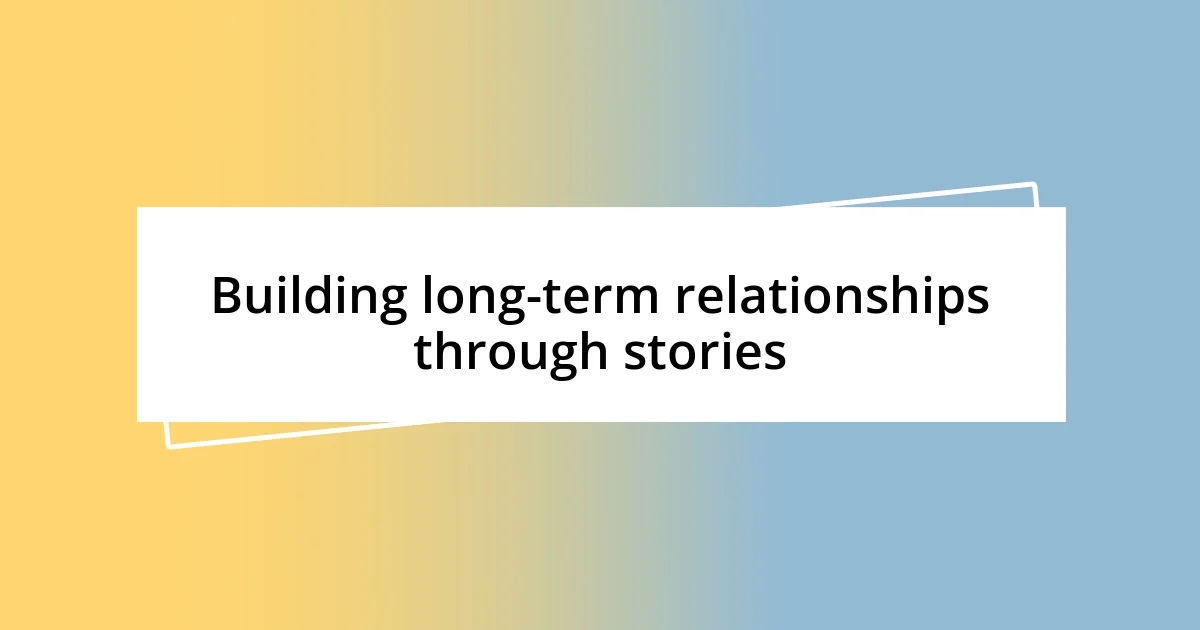
Building long-term relationships through stories
Building long-term relationships through stories is like weaving a delicate fabric of connections. I recall sharing a deeply personal account about my struggle with anxiety and how storytelling became my outlet. The unexpected wave of messages from others who resonated with my experience was powerful. It’s incredible how vulnerability can create trust; when people see their own stories reflected in yours, it forms a bond that withstands time.
In another instance, I wrote about the joy I found in community service, detailing a particular event where we helped a local shelter. I was touched by how many readers reached out, sharing their own moments of giving back. Isn’t it fascinating how stories not only connect us but also motivate us to take action? This mutual understanding fosters a supportive environment where relationships flourish.
I’ve also found that reflections on shared challenges can deepen connections significantly. The other day, I reflected on a tough period in my life, revealing how my friends rallied around me. The replies from others sharing their own challenging moments felt like a warm embrace. Have you noticed how pain can draw us closer together? It’s through these shared experiences that I have built lasting relationships grounded in empathy and support.












